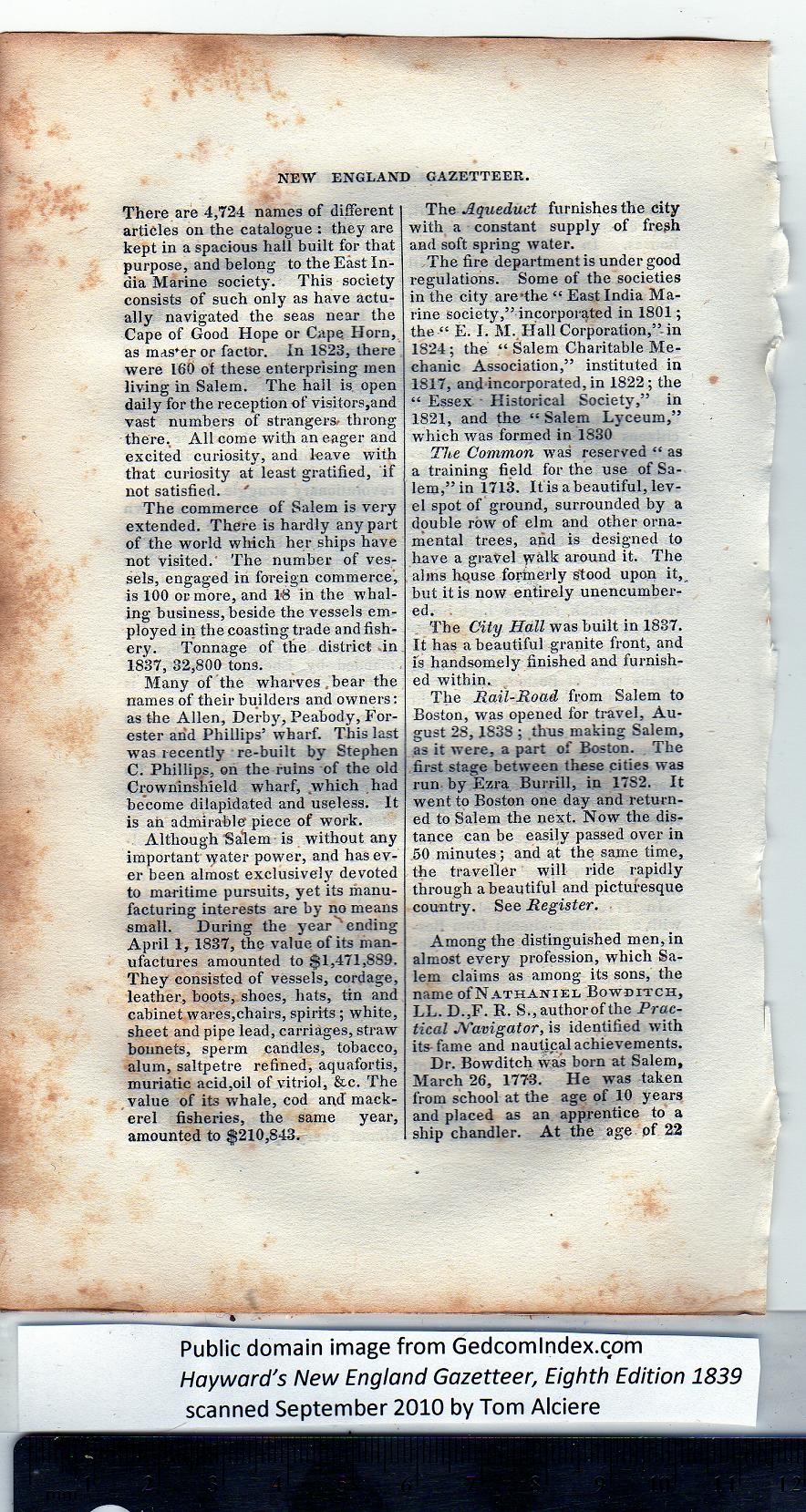|
There are 4,724 names of different
articles on the catalogue : they are
kept in a spacious hall built for that
purpose, and belong to the East In-
dia Marine society. This society
consists of such only as have actu-
ally navigated the seas near the
Cape of Good Hope or Cape Horn,
as master or factor, in 1823, there
were 160 of these enterprising men
living in Salem. The hall is. open
daily for the reception of visitors,and
vast numbers of strangers throng
there. All come with an eager and
excited curiosity, and leave with
that curiosity at least gratified, if
not satisfied.
The commerce of Salem is very
extended. There is hardly any part
of the world which her ships have
not visited. The number of ves-
sels, engaged in foreign commerce,
is 100 or more, and 1*8 in the whal-
ing business, beside the vessels em-
ployed in the coasting trade and fish-
ery. Tonnage of the district in
1837, 32,800 tons.
Many of the wharves,bear the
names of their builders and owners:
as the Allen, Derby, Peabody, For-
ester and Phillips’ wharf. This last
wras recently re-built by Stephen
C. Phillips, on the ruins of the old
Crowninshield wharf, which had
become dilapidated and useless. It
is an admirable piece of work.
Although 'Salem is without any
important water power, and has ev-
er been almost exclusively devoted
to maritime pursuits, yet its manu-
facturing interests are by no means
small. During the year ending
April 1, 1837, the value of its man-
ufactures amounted to $1,471,SS9.
They consisted of vessels, cordage,
leather, boots, shoes, hats, tin and
cabinet wares,chairs, spirits ; white,
sheet and pipe lead, carriages, straw
bonnets, sperm candles, tobacco,
alum, saltpetre refined, aquafortis,
muriatic acid,oil of vitriol, &c. The
value of its whale, cod and mack-
erel fisheries, the same year,
amounted to $210,843. |
The Aqueduct furnishes the city
with a constant supply of fresh
and soft spring water.
The fire department is under good
regulations. Some of the societies
in the city are*the “ East India Ma-
rine society,” incorporated in 1801;
the “ E. I. M. Hall Corporation,”-in
1824; the “ Salem Charitable Me-
chanic Association,” instituted in
1817, and incorporated, in 1822; the
“ Essex Historical Society,” in
1821, and the “ Salem Lyceum,”
which was formed in 1830
The Common was reserved “ as
a training field for the use of Sa-
lem,” in 1713. It is abeautiful, lev-
el spot of ground, surrounded by a
double row of elm and other orna-
mental trees, and is designed to
have a gravel yralk around it. The
alms house formerly stood upon it,
but it is now entirely unencumber-
ed.
The City Hall was built in 1837.
It has a beautiful granite front, and
Is handsomely finished and furnish-
ed within.
The Rail-Road from Salem to
Boston, was opened for travel, Au-
gust 28,1838 ; thus making Salem,
as it were, a part of Boston. The
first stage between these cities was
run by Ezra Burrill, in 17S2. It
went to Boston one day and return-
ed to Salem the next. Now the dis-
tance can be easily passed over in
50 minutes; and at the same time,
the traveller will ride rapidly
through abeautiful and picturesque
country. See Register.
Among the distinguished men, in
almost every profession, which Sa-
lem claims as among its sons, the
name of Nathaniel Bowditch,
LL. D.,F. R. S., author of the Prac-
tical Navigator, is identified with
its fame and nautical achievements.
Dr. Bowditch was born at Salem,
March 26, 1773. He was taken
from school at the age of 10 years
and placed as an apprentice to a
ship chandler. At the age of 22 |
